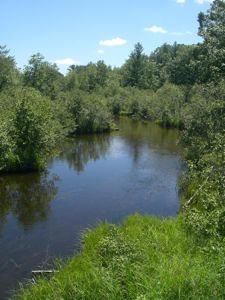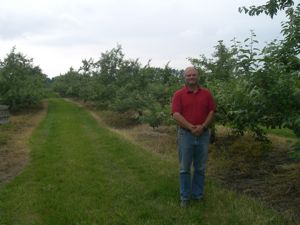Protecting Abundant Water
Air Date: Week of November 12, 2010
 |
Michiganders don't have to worry much about having an adequate supply of water. But efforts by Nestlé to bottle water in the state, and the prospect of drier times in a climate-changed future, are leading some residents to try to put Michigan groundwater under permanent protection. Andrew Stelzer reports.
Transcript
GELLERMAN: Michigan is awash in water. There are the Great Lakes of course - loads of streams and rivers, and an underground aquifer flowing with tens of billions of gallons of water a day. But the groundwater only seems endless. So when food giant, Nestle, announced plans to tap and bottle underground water in western Michigan, many residents became worried, and decided to act. And as Andrew Stelzer reports there’s now a growing movement to turn Michigan’s groundwater into a public trust…owned by state residents.
[WAVES ON LAKE MICHIGAN]
STELZER: For Michiganders, getaways on the shores of lake Michigan are practically a birthright. Summers it’s to escape blazing Midwestern heat. In the colder months its a haven for cross country skiing, hiking and ice fishing. And the same water that fills the lakes, makes Western Michigan farm country—a top Cherry and apple producer.
[CLANK OF WELL]
SMELTZER: See that’s…the well is in the ground…the pump and everything is in the hole down there almost 190 feet …so lemme get some water running…
[WATER RUNNING OUT OF WELL]
STELZER: Dave Smeltzer owns and operates Per-Clin orchards, an apple and cherry farm about 5 miles from Lake Michigan in Bear Lake. Smeltzer estimates he uses about 1.7 million gallons of well water a year, to irrigate his fields, and cool his cherries after they’re picked. There’s so much water under his land, his two wells have never run dry in 50 years. And he has no concern that the future will be any different, even for his neighbors, who run larger operations.

Dave Smeltzer, owner of Per-Clin Orchards, among his apple trees. (Photo: Andrew Stelzer)
SMELTZER: Some of these guys are running their wells constantly. I can’t imagine how much withdrawal, and yet there's still water, there's still water. It's recharged, Lake Michigan, the level of Lake Michigan is not dropping, there's water available for us to use. We need to understand that water is renewable, just like trees. You can plant trees, it rains, water is renewable, it's always there.
STELZER: Smeltzer’s confidence in an infinite water supply is pretty common among Michiganders. Many towns around here don’t even have water systems, everyone just digs a well and gets their water off their own land—for free. But a couple of bottled water plants have brought the question of water regulation and use to a head. The Nestle company wanted to extract water from a shallow stream for its Ice Mountain brand.
[BIRDS CHIRPING]
PEASLEY: They were talking about pumping over a hundred thousand maybe quarter of a million gallons a day.
STELZER: Jay Peasley is a board member on the White River Watershed Partnership and was part of the group that sued Nestle.

Jay Peasley at the White River, near where Nestle wanted to set up a water bottling plant. (Photo: Andrew Stelzer)
PEASLEY: So, you’re talking about cutting the flow by, I think it was 20% or something, and it's a blue ribbon trout steam up here, they have native brookies in it. So, not only would the fish be impacted, so would everything else that lives here - the goldfinch, the eagles, just everything that live in this area.
STELZER: Amid an uproar, Nestle had to cancel its White River plans. At another Nestle site, a judge agreed the company’s project would sharply reduce the flow of the little Muskegan River. But, the ruling also changed the equation for such projects. Before, you could use water until it affected your neighbor. Now, the economic benefit of extracting groundwater could outweigh ecological harm. That got the attention of State Representative Dan Scripps, whose district covers 100 miles of Lake Michigan coast.
SCRIPPS: Even though you're causing harm to the resource, even though it's not sustainable and you're hurting your neighbor’s ability to access their well and their water- now, if you can show a large enough profit, we may let you do it anyway. Well, that, I think, put us on a slippery slope.
STELZER: So Scripps has proposed a solution in the state legislature. He wants to put Michigan’s groundwater into what’s called a ‘Public Trust’. It’s a designation that already protects most rivers, lakes, and streams in Michigan. With this bill, the water underground would now also be owned by all residents of Michigan and protected by the state. A hedge perhaps, against a future, water-limited world.
OLSEN: The statistics globally are that there's a global water crisis and the scarcity and demand is going to strip supply by 30 percent in, what, 20 or 30 years- in the most recent reports that I’ve seen..
STELZER: That’s Attorney Jim Olsen. He argued the case against Nestle.
OLSEN: So, those people have their heads in the sand to believe that we are, somehow- have this unlimited supply and the rest of the world won't come at it when they're thirsty.
STELZER: Olsen’s concerned about a day when climate change could turn this region into a no-cost freshwater fountain for the world.
OLSEN: There will be very little that people will be able to do to stop the transport of water out of the Great Lakes Basin.
STELZER: But not all Michiganders are concerned about a run on the state’s water supply by drought-driven outsiders. This public trust idea is seen as a threat by some who worry the law would give the government too much control, and lead to the taxing and regulation of people’s wells. People like orchard owner Dave Smeltzer.

Eric Neubecker with one of his company's well drilling rigs. (Photo: Andrew Stelzer)
SMELTZER: I just fundamentally and philosophically disagree with Representative Scripps on this issue. Because, there's adequate protection for water in Michigan now, so this additional layer of legislation intrudes more into a personal use of the water and the private property rights thing.
[SOUND OF WELL DRILLING MACHINE]
STELZER: Additionally, industries that use large amounts of water are concerned the law might prevent them from getting it for free, and that could have an economic ripple effect. Eric Neubecker is a geologist at his family’s well digging business, the Ramer Company, in Marne, Michigan. They drill 250 wells every year.
NEUBECKER: The abundant ground water in the state of Michigan is one reason why the farmers, the fruit growers are here. And now, if we make it unattractive for them to be in business here, that would have an adverse effect on our business because there would be fewer wells to work on, fewer wells to drill. It would just have a total negative effect on the entire economy.
STELZER: Representative Scripps says his bill would not result in any taxes at all. He says it’s essential that the Great Lakes water, which accounts for more than 20 percent of the world’s surface freshwater supply, is protected at all stages, not just above ground where we can see it.

The White River in western Michigan, near the site where Nestle wanted to set up a water bottling plant. (Photo: Andrew Stelzer)
SCRIPPS: If we don’t have protections on every stage of the water cycle, the truth is, that we don’t really have protections on the Great Lakes, because they're all connected….Because a private right to water, if the water is not there doesn’t mean a whole lot.
STELZER: Vermont and Hawaii already hold groundwater in a kind of trust, and the results there have been positive. But, Michigan has never suffered a significant water shortage, so preventing a future one will likely be a hard sell in the state legislature next year. For Living on Earth, I’m Andrew Stelzer, in Benzie County, Michigan.
Links
Business Perspective on MI Water
Michigan Citizens for Water Conservation
Living on Earth wants to hear from you!
Living on Earth
62 Calef Highway, Suite 212
Lee, NH 03861
Telephone: 617-287-4121
E-mail: comments@loe.org
Newsletter [Click here]
Donate to Living on Earth!
Living on Earth is an independent media program and relies entirely on contributions from listeners and institutions supporting public service. Please donate now to preserve an independent environmental voice.
NewsletterLiving on Earth offers a weekly delivery of the show's rundown to your mailbox. Sign up for our newsletter today!
 Sailors For The Sea: Be the change you want to sea.
Sailors For The Sea: Be the change you want to sea.
 The Grantham Foundation for the Protection of the Environment: Committed to protecting and improving the health of the global environment.
The Grantham Foundation for the Protection of the Environment: Committed to protecting and improving the health of the global environment.
 Contribute to Living on Earth and receive, as our gift to you, an archival print of one of Mark Seth Lender's extraordinary wildlife photographs. Follow the link to see Mark's current collection of photographs.
Contribute to Living on Earth and receive, as our gift to you, an archival print of one of Mark Seth Lender's extraordinary wildlife photographs. Follow the link to see Mark's current collection of photographs.
 Buy a signed copy of Mark Seth Lender's book Smeagull the Seagull & support Living on Earth
Buy a signed copy of Mark Seth Lender's book Smeagull the Seagull & support Living on Earth

